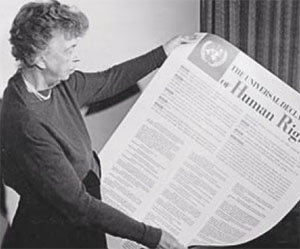国務省出版物
女性実力者の系譜-政府における女性の役割 「アナ・エレノア・ルーズベルト」

エレノア・ルーズベルトは、世界人権宣言に関する業績を自らの最大の遺産と考えていた
「世界のファースト・レディ」
1884年10月11日生まれ、1962年11月7日死去
ニューヨーク市の裕福で有力な家庭に生まれたアナ・エレノア・ルーズベルトは、夫のフランクリン・デラノ・ルーズベルトの大統領任期中(1932-1945年)に、ファースト・レディの役割を大きく変えた。彼女は、権力を持たない者(少数民族、女性、貧しい人々、弱い立場にある人々)に発言権を与えることによって、世界中の何百万もの人々にインスピレーションを与えた。一方、人権、公民権、そして女性の権利に献身する彼女の活動は賛否両論を呼んだ。
エレノア・ルーズベルトは10歳で孤児になり、内気で自信のない少女だった。彼女は一家の習慣を引き継いで社会奉仕に携わり、セツルメント・ハウスの教師を務めた後、1905年に外向的ないとこのフランクリンと結婚した。2人の間には6人の子どもが生まれたが、1人は幼時に死亡した。1910年に夫がニューヨーク州議会上院議員に選出されたことで、エレノアの政治的協力者としての人生が始まった。
エレノア・ルーズベルトの伝記作者の間では、彼女が1918年に、夫がエレノアの私設秘書と浮気をしていることを発見した心的トラウマが、社会活動にのめり込む原因となったという見方もあるが、一方、彼女の受けた教育と交友関係の広がりが社会活動のインスピレーションになったという意見もある。1921年にフランクリン・ルーズベルトがポリオに罹ってから、エレノアは彼の政治家としてのキャリアと彼女自身の社会正義の理想を推進するため、ますます熱心に政治に取り組むようになった。
ルーズベルトが大統領に当選すると、エレノアは大恐慌に打ちのめされていた米国の各地を訪問して回った。そして、各地の実態を夫に報告するとともに、女性や少数民族の平等の権利、子どもの福祉、住宅政策改革などをたゆまず促進し続けた。彼女は大統領夫人として初めて、定期的に記者会見を行い、各紙に配信されるコラム「My Day」を書き、ラジオ解説番組に出演し、また講演旅行に出たり政治大会で演説をしたりもした。彼女はシンボリズムを非常に有効に使った。例えば1939年に愛国婦人団体「Daughters of the American Revolution(DAR―アメリカ革命の娘たち)」が、アフリカ系米国人の歌手マリアン・アンダーソンが同団体のホールで公演することを彼女の人種を理由に禁じたとき、エレノアはDARを脱退し、代わりにアンダーソンがリンカーン記念堂で歌うことを提案した。そのコンサートは7万5000人の聴衆を集めた。
フランクリン・ルーズベルトの死後、ハリー・トルーマン大統領はエレノアを国連代表に任命した。彼女は、国連人権委員会の委員長を務め、世界人権宣言の草案作成と採択に主導的な役割を果たした。1961年には、ジョン・F・ケネディ大統領により「女性の地位に関する大統領委員会」の委員長に任命され、1962年に死去するまでその任を務めた。
トルーマン大統領は、ルーズベルト夫人を、尊敬を込めて「世界のファースト・レディ」と呼んだ。しかし、彼女自身は自分の業績について、「私はその時々でしなければならないことをしてきただけです」と謙虚に語っている。
*上記の日本語文書は参考のための仮翻訳で、正文は英文です。
Anna Eleanor Roosevelt - Women of Influence
First Lady of the world
(Born: October 11, 1884; Died: November 7, 1962)
Born to a rich and influential family in New York City, Anna Eleanor Roosevelt transformed the role of first lady during her husband Franklin Delano Roosevelt's presidency of the United States (1932-1945). She became an inspiration to millions around the world by giving a voice to the powerless: minorities, women, the poor, and the disadvantaged. She was a controversial figure to others because of her dedication to human rights, civil rights, and women's rights.
Orphaned at the age of 10, Eleanor Roosevelt grew up shy and insecure. She followed her family's tradition of community service, teaching in a settlement house before marrying her outgoing cousin Franklin in 1905. They had six children, one of whom died as an infant. Her husband's election to the New York State Senate in 1910 launched her career as political helpmate.
Several of her biographers see her traumatic discovery in 1918 of her husband's affair with her social secretary as the spur behind Eleanor's expanded social activism, but others point to her education and expanding network of friends as her inspiration. When Franklin Roosevelt was stricken with poliomyelitis in 1921, she turned increasingly to politics, to further his career and her ideals of social justice.
Once Roosevelt was elected president, Eleanor toured a country devastated by the Great Depression. She reported back to him on conditions and tirelessly promoted equal rights for women and minorities, child welfare, and housing reform. She became the first president's wife to hold regular press conferences, to write a syndicated column ("My Day") and do radio commentary, to go on the lecture circuit, and to address a political convention. She used symbolism to great effect: In1939, when the Daughters of the American Revolution banned African-American singer Marian Anderson from performing in their auditorium because of her race, Eleanor Roosevelt resigned from the organization. She suggested that Anderson sing at the Lincoln Memorial instead, in a concert attended by 75,000 people.
After Franklin's death, President Harry Truman appointed her a delegate to the United Nations. She served as chairman of the U.N.'s Commission on Human Rights and played a leading role in the drafting and adoption of the Universal Declaration of Human Rights. In 1961, President John F. Kennedy made her the chair of the President's Commission on the Status of Women, work she continued until her death in 1962.
President Truman admiringly called Mrs. Roosevelt "First Lady of the World." She was, typically, more unassuming in describing her achievements: "I just did what I had to do as things came along."
For additional information, see:
Roosevelt, Anna Eleanor. The Autobiography of Eleanor Roosevelt. Cambridge, MA: Da Capo Press, 1992.
Roosevelt, Anna Eleanor. My Day: The Best of Eleanor Roosevelt's Acclaimed Newspaper Columns, 1936-1962. Cambridge, MA: Da Capo Press, 2001




